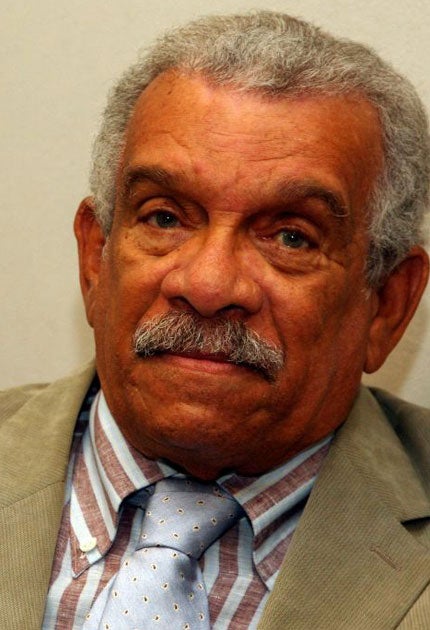Derek Walcott: Of poetry, prizes and post-colonialism
Derek Walcott, the winner of this year's TS Eliot prize, talks to Rob Sharp about why Britain means little to him

Your support helps us to tell the story
From reproductive rights to climate change to Big Tech, The Independent is on the ground when the story is developing. Whether it's investigating the financials of Elon Musk's pro-Trump PAC or producing our latest documentary, 'The A Word', which shines a light on the American women fighting for reproductive rights, we know how important it is to parse out the facts from the messaging.
At such a critical moment in US history, we need reporters on the ground. Your donation allows us to keep sending journalists to speak to both sides of the story.
The Independent is trusted by Americans across the entire political spectrum. And unlike many other quality news outlets, we choose not to lock Americans out of our reporting and analysis with paywalls. We believe quality journalism should be available to everyone, paid for by those who can afford it.
Your support makes all the difference.A summer's day at the University of Essex cannot infiltrate the gloom of the institution's Lakeside Theatre. Lit dimly from the stage, a second-row seat is occupied by one of poetry's shining lights, Derek Walcott, who fails to hide his darkened mood.
Walcott, winner of the 1992 Nobel Prize in Literature, last year attracted acclaim for his latest collection White Egrets, which won this year's TS Eliot poetry prize. Now 81, he continues to master his poetic "calling", though attracts controversy. Two years ago, his bid to become Oxford University's poetry professor was stymied by an anonymous smear campaign over a 1980s sexual-harassment allegation. He later withdrew from the race.
Walcott has made a rare foray to Britain to promote a Lakeside Theatre retelling of his 1958 play Ti-Jean and His Brothers, which tells the story of three St Lucian brothers who "leave home to seek their fortune". Walcott's familiar themes of an island idyll blighted by colonialism were re-explored, though this time the poet said he reworked the poetic dialogue to become "more conversational".
"I don't think of it as a poem, I think of it as a play, but I think of the dialogue being more immediately poetic in scansion and rhyme than anything I've done before," he says.
In person, Walcott looks younger than his age, even though he slumps in his seat. He ponders his responses carefully, mostly replying with one- or two-sentence answers before tailing off.
Before the interview his colleagues at the University of Essex, where he is poetry professor, say he refuses to discuss the Oxford row. Walcott also responds to questions over a 2008 public falling-out with VS Naipaul – in which Walcott described his fellow Nobel Laureate's work as "dead" – as "irresponsible". He regards the term "post-colonial" in reference to themes in his work as "a cliché". He is scarcely more forthcoming over the TS Eliot prize.
"I didn't think about it," he says. "I am not in England, I live in the Caribbean. So I am not hungover by prizes and awards because it does not happen very often. After a while, when the writer is mature, it doesn't really matter, not because of finances, but because of reputation. It doesn't really matter how many awards you get". Though he does admit that "it was nice to have won it".
The poet seems to be distancing himself from British life. In 1999, he said he would be "very flattered" to be offered the chance to be British poet laureate (even though giving the position to a foreigner would be something of a break from protocol). Now, he says: "I don't have anything against it, but it's not my tribe. I don't want to write poems about the royal wedding. I would have to be moved by the event. My relationship to Britain is of no consequence."
He is happier describing the work of younger Caribbean writers, such as Lorna Goodison. "There are a couple of younger writers coming through who are very solid in terms of structure," he adds. "Syntax used to be vehement. Now it is more considered. There is a new generation who is taking the craft of writing much more seriously".
Walcott is now working on two film scripts. Famously, he used to get up at 4.30am to work; now he tries to take things easy. "It used to be to smoke, not to work," he corrects. "So now I sleep late. I like to conserve what I am doing because there is a tremendous amount of waste in plays. Stuff you are not going use. That's happened to me my whole life."
Join our commenting forum
Join thought-provoking conversations, follow other Independent readers and see their replies
Comments